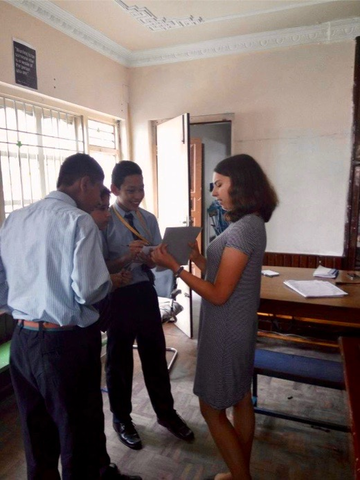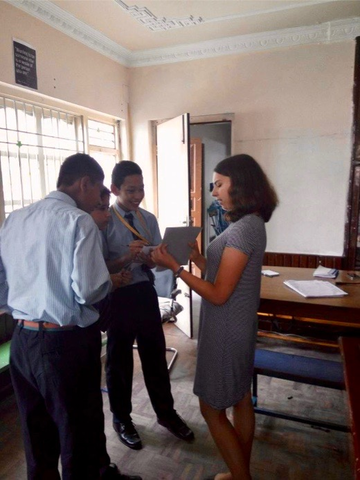NEWS
April 12, 2017

IN BRIEF
By: Ilana Panth, Accountability Lab Intern Last summer, while visiting my family in Kathmandu, I was compelled to get involved with the community. I got in contact with a local organization funded by Accountability Lab, Sambhawana, which aims to provide meaningful civic education to young people in Nepal. After several discussions with the Sambhawana team, we decided that I would be able to make the most impact by teaching civics through debate, a subject I have been heavily involved with in my high school. Sambhawana gave me the freedom to design my own 3-day curriculum, which I created to be [...]
SHARE
 By: Ilana Panth, Accountability Lab Intern
By: Ilana Panth, Accountability Lab Intern
Last summer, while visiting my family in Kathmandu, I was compelled to get involved with the community. I got in contact with a local organization funded by Accountability Lab, Sambhawana, which aims to provide meaningful civic education to young people in Nepal. After several discussions with the Sambhawana team, we decided that I would be able to make the most impact by teaching civics through debate, a subject I have been heavily involved with in my high school. Sambhawana gave me the freedom to design my own 3-day curriculum, which I created to be tailored to a wide variety of classes for students in grades 7-12. I had never designed a curriculum before, and so I relied heavily on my experience teaching the first class to help me figure out the the lesson plans; I asked the students what parts of the class they liked and made sure those parts stayed in the curriculum.
On the first day in each school I introduced debate and tried to emphasize that debate was a tool you could use to understand any topic. The students told me about the things they were interested in, such as sports and technology, and together we came up with subject matters to use for practice debates. My favorite topic the students and I came up with was about whether or not animals should be kept in zoos. The second day of the program we discussed civics. Since so much of Nepal was affected by the recent earthquake, many of the students talked about whose responsibility it was to repair damages caused by the earthquake- the government or citizens. We also talked about the foundations of a government system, and the ways in which citizens interact with the government. They were able to connect these topics to the problems that they themselves had seen.
On the final day, students applied what they had learned through debates about civic topics that we had talked about the day before. By working with them for a few days, I was able to introduce debate as a form of discussion in stages. I think, ultimately, the part of the curriculum that had the biggest impact was this very thing; I didn’t need to tell them what debate could do, I was able to show them instead throughout my time working with them.
Seeing how passionate the students were to solve problems they saw in their communities helped me understand the importance of civic education. I hope that, through the program, the students I worked with saw that they were more than capable of discussing these big issues and coming up with solutions. I also learned a lot about civic education in Nepal from the other volunteers with Sambhawana. For example, while I was teaching debate, another volunteer was talking to communities about the importance of preventing teen marriage. I was inspired by everyone I met while volunteering, students, school principals, and other volunteers alike.
My work with Sambhawana sparked an interest in civic education, and made me wonder how I could continue my involvement with similar organizations. I talked to my supervisors at Sambhawana about Accountability Lab, since I live in DC, where Accountability Lab is based. They helped me to get in contact with an Accountability Lab Nepal team member, who I met with to discuss the kind of work the lab does. I was motivated the organization’s unique approach and am excited for the opportunity to intern with its DC headquarters and further the cause of civics around the world.
